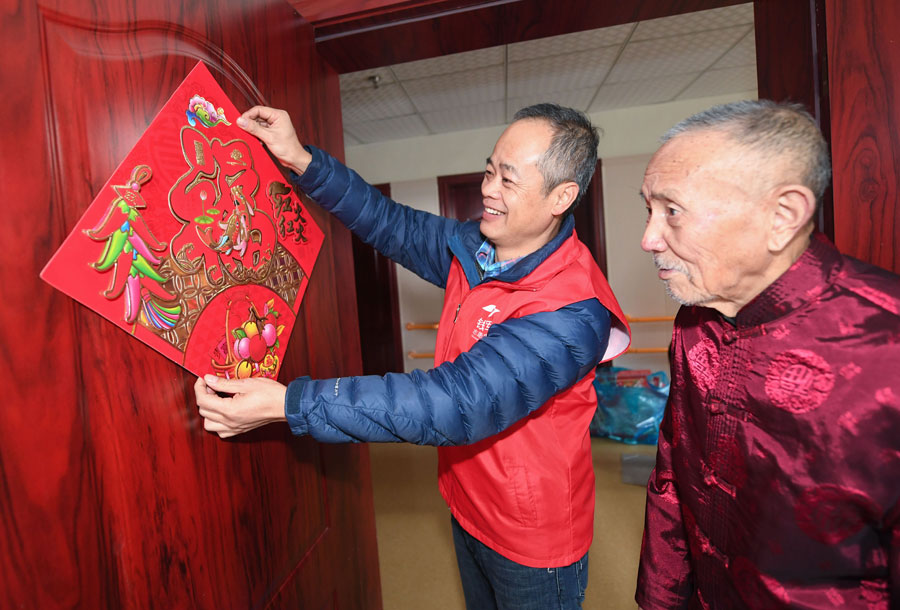
This Spring Festival, Chinese travelers are expected to make 3 billion trips, up 0.6 percent from the year before.
But a new trend is emerging known as “reverse Spring Festival Travel.” Instead of children traveling home to see their parents, it’s the other way around, and now, parents are traveling to see their children.
Lower travel costs and less hassle are the major reasons why a growing number of people have chosen to ask their parents to travel to the cities they work in.
Railway companies like the new trend as it means better railway capacity, balanced passenger numbers on trains heading in opposite directions, and smoother travel during the Spring Festival.
The number of passengers traveling in the opposite direction on high demand routes has been increasing at an annual rate of about 9 percent for the past four years, said Li Wenxin, a vice-general manager at China Railway Corporation.
Today’s Story in the Story looks at “reverse Spring Festival Travel rush” the latest trend to emerge that turns tradition upside down as parents are now traveling to see their children during China’s biggest holiday, rather than the other way around.
Passengers on the train K4051 to Nantong City in east China's Jiangsu Province wait for departure at the Beijing Railway Station in Beijing, capital of China, Jan. 21, 2019, the first day of the 2019 Spring Festival travel rush. (Photo: Xinhua)
The Spring Festival travel rush, the biggest annual human migration in the world, is underway, but Dong Liangjian, from Xiangtan, Central China's Hunan Province, who works in Guangzhou, will not be part of it this year. Instead, his parents will travel to Guangzhou for the holiday family reunion.
Dong, who is 33 years old, is part of a growing number of younger-generation Chinese who asks their parents to visit them in the cities where they work, mostly in first- and second-tier cities.
For Dong, who’s married and works at a trading company, asking his parents to visit him spares him the experience of traveling during Spring Festival, which often includes waking up to buy railway tickets and then standing for hours on crowded trains.
"It's much easier for my parents to come to Guangzhou than me going to Xiangtan as there are lots of train tickets to Guangzhou. The city is also better for them in the winter because it's warmer. They can stay here for as long as they want and there is no need to rush back for work," said Dong.
Other than parents and their children traveling to visit one another, families are choosing to travel together rather than stay at home.
Chinese people are expected to make 400 million trips for sightseeing during the holiday, including 7 million trips abroad covering 900 destinations in 96 countries and regions.

A volunteer at a home for seniors in Cixi, Zhejiang province, helps a resident stick a poster bearing the character Fu, meaning "luck", on the door of his room to celebrate the upcoming Spring Festival, on Saturday. (Photo: Xinhua)
Another driving factor is how single people fall under tremendous pressure during the holiday regarding their single status. Their relatives ask them so many questions about marriage, dating, how much money they make and if they own property.
Not everyone, however, enjoys the idea of asking their parents over. Some people think they will not be able to accommodate their parents well in top-tier cities during the Chinese New Year, while others prefer going back to the hometown for the festival.
Winnie Sun, a 31-year-old public relations officer from Shandong Province now working in Beijing, said she would only consider asking her parents over for Spring Festival if she owned her own apartment in Beijing.
"I rent a small studio apartment in Beijing, and I can't imagine bringing my parents here because it would be so crowded. In comparison, my parents' home in our hometown is much bigger and cozier. Besides, I come from a big family so there are a lot of relatives to visit during the Spring Festival," she said.
Song, from Anhui Province, said his parents visited him once but they weren't interested in shopping and sightseeing there and longed to be with relatives and friends during the New Year. "My parents weren't so happy that Spring Festival," he said.
CCTV reported that the trend shows how migrant workers have stable housing in big cities, which makes them feel at home.
One Chinese traveler said, "Home can be anywhere as long as a family gets together. Reverse Spring Festival travel is a smart way for people working in the cities to reunite with their families.”
(Produced by Nancy Yan Xu, Lance Crayon, Brian Lowe and Da Hang. Music by: bensound.com. Text from China Daily and Global Times.)


